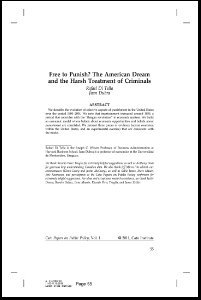By E.A.C. Raaijmakers
In thinking about punishment, and imprisonment in particular, the concept of severity plays a central role. After all, the severity of imprisonment is assumed to deter offenders from committing crime and is used as the vehicle to express a proportionate amount of blame and censure to the offender. Unfortunately, the concept of severity as it has been understood for the past three centuries, mostly pertains to the objective severity of imprisonment. Severity in this view is considered to be merely dependent upon objective properties of punishment, most notably its duration. A prison sentence for instance, is considered to be more aversive simply insofar as it is longer rather than shorter. The severity as experienced by inmates themselves, however, has barely been explored. This thesis assesses the determinants of the subjectively experienced severity of imprisonment, and its consequences for the remembered severity of imprisonment, and post-release offending behavior. The findings reveal that inmates differ markedly in their experienced severity of imprisonment. In addition, inmates’ experienced severity of imprisonment changes substantially over the course of incarceration. While the severity as experienced while being incarcerated is strongly related to the severity as remembered following release, it is not related to post-release offending behavior.
Leiden, Netherlands: Leiden University, 2017. 153p.



